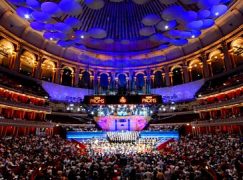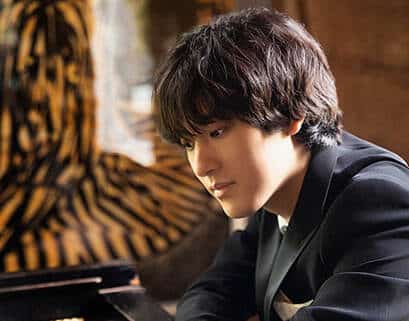Edinburgh Festival: Benedetti asks the question
NewsThe theme of this summer’s Ed Fest,curated for the first time by Nicola Benedetti, will be ‘where do we go from here?’. It seems exceptionally timely, given the state of Scottish politics and the general retreat from arts funding in the UK.
The substance of the festival is mostly unchanged, There will be residencies from the Budapest Festival Orchestra and the LSO, some interesting visiting ensembles and some cool-looking imported opera.
The one flaw is the presence of the Venezuela regime’s propaganda orchestra, condcuted by Dudamel and Payare. This looks like a judgement call, and a wrong one.
Here are the highlights, as put out by the festival office:
(UPDATE: First responses here.)
• Two exceptional programmes from powerhouse dance company, Alvin Ailey American Dance
Theater. The performances showcase recent works from the company’s dynamic choreographers
as well as classic repertoire by founder, Alvin Ailey, including one piece featuring local Scottish
dancers alongside the professional company.
• An exciting new series in The Hub, the International Festival’s home on the Royal Mile. In a first for
the International Festival, the space will be taken over by afternoon and evening informal events
and concerts that speak directly to the 2023 Festival’s themes. Performers include: Palestinian
singer Nai Barghouti, Scottish violinist Catriona Price, the Aga Khan Master Musicians
celebrating music from the Silk Road trade route and a special Festival commission inspired by
Martin Luther King Jr’s visionary final speech, from Detroit-born bassist and house musician of The
Late Show with Stephen Colbert, Endea Owens.
• The Budapest Festival Orchestra, led by conductor Iván Fischer, in residence at the International
Festival across four captivating concerts. A highlight performance will be Dvořák’s Eighth Symphony
presented in an informal performance in the round, with the audience seated on beanbags,
scattered amongst the orchestra. The concerts also include an all-Hungarian programme of works
with Sir András Schiff and the NYCOS National Girls Choir, Weber and Mendelssohn, a concert
celebrating three 19th-century Romantics and an in-conversation between Fischer and Nicola
Benedetti exploring orchestras of the future and the orchestra’s ongoing commitment to community.
• Three UK premieres from genre-defining stars of international theatre: Barrie Kosky’s The
Threepenny Opera from the Berliner Ensemble, Brazilian film and theatre director Christiane
Jatahy’s Dusk, based on Lars Von Trier’s Dogville, and Tiago Rodrigues’ As Far As
Impossible, recounting the everyday lives of humanitarian workers in war zones.
• One of Latin America’s greatest orchestras, the Simón Bolívar Symphony Orchestra of
Venezuela, in residence at the International Festival. Bringing its famed young ensemble of players
aged 18-25, they are joined by conductors Gustavo Dudamel and Rafael Payare for a series of
performances, including music from across the Americas and Beethoven’s Ninth Symphony.
• An epic new production of Pina Bausch’s acclaimed choreography of Stravinsky’s The Rite of
Spring, with a cast of over 30 dancers from 14 African countries, presented in a double bill with duet
common ground[s] from Germaine Acogny and Malou Airaudo.
• The London Symphony Orchestra in residence, comprising a programme centered around hope:
a concert of choral works from Szymanowski and Brahms; a cinematic programme featuring
Principal Guest Conductor Gianandrea Noseda, Messiaen’s sensational Turangalîla Symphony;
and an intimate insight into the musical world of the London Symphony Orchestra, presented with
an on-stage conversation from Nicola Benedetti and Sir Simon Rattle.
• The most substantial programme of Korean artists in the International Festival’s 76-year history, in
celebration of 140 years of diplomatic relations between Korea and the UK. Performances include
the KBS Symphony Orchestra in their first UK appearance; International Festival debuts from
multi-award-winning performers, pianist Yeol Eum Son and violinist Clara-Jumi Kang; first prize
winners of the International Mozart Competition, the Novus String Quartet; and a fusion of ancient
Korean storytelling, K-pop and Greek tragedy in Trojan Women by the National Changgeuk
Company of Korea. Trojan Women features original music by K-pop producer and Parasite and
Squid Game composer Jung Jae-il, in collaboration with renowned pansori master Ahn Sook-sun.
• Immersive works The Lost Lending Library from Punchdrunk Enrichment, welcoming young
people aged 6-11 (and their parents or carers) into a magical traveling library; and FOOD, an
enchantingly absurd dinner party from New York City-based theatre-maker Geoff Sobelle. The
uniquely Scottish play, the National Theatre of Scotland’s Thrown, from writer Nat McCleary under
director Johnny McKnight comes to the Festival as part of its world premiere season, and all three
productions will run for the entire duration of the Festival.
• Operatic works including a concert performance of Tannhäuser, the only major Wagner opera that
has not been performed at the International Festival. Wagner expert and Edinburgh local Sir
Donald Runnicles conducts the Deutsche Oper Berlin, featuring American tenor Clay Hilley
making his role debut as Tannhäuser; Mozart’s enchanting masterpiece The Magic Flute
performed in concert by the Scottish Chamber Orchestra and Chorus; and a radical retelling of
Bartók’s Bluebeard’s Castle presented by Theatre of Sound, reimagining the relationship
between Bluebeard and Judith as a husband and wife facing the reality of living with dementia whilst
celebrating their long love.
• A contemporary dance programme featuring Phaedra/Minotaur, a sensational double bill from
opera and theatre director Deborah Warner and choreographer Kim Brandstrup, with Benjamin
Britten’s stirring final cantata Phaedra, and the return of maverick duo Sharon Eyal and Gai
Behar’s acclaimed L-E-V, with the final installation of their acclaimed Love Cycle Trilogy, Chapter
3: The Brutal Journey of the Heart.
• Ogresse, a new musical journey of myth and song from three-time Grammy Award-winner Cécile
McLorin Salvant. Cécile also performs in the Usher Hall for a special concert fusing jazz with blues,
theatre and storytelling.
• World-leading orchestras are center stage in Edinburgh’s Usher Hall, including: the Oslo
Philharmonic Orchestra, Deutsche Oper Berlin, Royal Scottish National Orchestra, BBC
Scottish Symphony Orchestra and the Scottish Chamber Orchestra and Chorus with a concert
performance of The Magic Flute, featuring a newly commissioned narration read by Thomas
Quasthoff.
• A contemporary music programme featuring electro-pop icon Alison Goldfrapp; sitar virtuoso
Anoushka Shankar; founding member of The Velvet Underground, John Cale; indie chart-topper
Jake Bugg; Japanese folk artist Ichiko Aoba; award-winning Irish neo-folk group Lankum;
Grammy Award-winning bluegrass band Nickel Creek; and experimental electronic icon Matthew
Herbert.
• Intimate morning recitals at The Queen’s Hall featuring pianists Mao Fujita, Leif Ove Andsnes and
Bertrand Chamayou; vocal recitals from singers including Julia Bullock with pianist Bretton
Brown, Iestyn Davies, Catriona Morison; and chamber music from the Isidore String Quartet,
the Amatis Trio, Jupiter Ensemble and more.






That’s a pretty big flaw. It looks like they left “Art-washing” off the list of festival themes.
The worldwide renown of the Simón Bolívar Symphony Orchestra sticks in the craw of American plutocrats, not only because it shows that socially oriented government can have beneficial results, but also because it shines a revealing light on the USA’s embarrassingly anachronistic system of arts funding by and for the wealthy whose inadequacies cause so much harm. All those young, vibrant musicians have become a symbol of defiance and social equality that presents a real problem for US propaganda.
In your 1999 article “Symphony Orchestras and Artist-Prophets: Cultural Isomorphism
and the Allocation of Power in Music” (Leonardo Music Journal 9: 69–75), you described the social structures of symphony orchestras as autocratic and hierarchical. How did you get from there to the orchestra as a symbol of social equality? Your article’s argument about cultural isomorphism, the symphony orchestra, and authoritarianism provides an excellent explanation for the Venezuelan regime’s support for El Sistema.
Hello Geoff. For scholarly accuracy, we have to recognize that highly complex social phenomena like symphony orchestras have many dimensions. Yes, orchestras are autocratic and hierarchical. By the very nature of orchestras, those characteristics are also represented in Sistema ensembles.
And yet there are additional dimensions to orchestras. They follow in a long history of cultural elitism centered in European classism that began with feudalism and was continued after the rise of the bourgeoisie.
The classism surrounding orchestras is especially notable in the USA where the fine arts are supported mainly by wealthy private donors. This also affects our systems of music education where children from better off middle class and upper class families are more typically given access to excellent musical instruction while poorer children often aren’t. Poorer children also often lack parental support for dedicated studies of classical music. Progress is being made to close these gap, but the dichotomies are still blatantly apparent.
Sistema in Venezuela is notably different since its educational systems are to a large degree publicly funded, and with a specific social ethos of offering excellent musical education to the poor. Without the same high level of public funding, and the same socialist ethos, Sistema in the USA turned out to be less effective.
The same socialist ethos also offers strong financial support for Venezuelan orchestras similar to the social democracies of Europe. This allows Venezuelan orchestras to offer affordable tickets and develop effective educational and outreach programs while many American orchestras struggle just to meet basic costs and can’t offer the same level of educational and outreach programs.
These factors have helped to close class the dichotomies that surround classical music in the USA and have created a classical music community with more social equality.
I’m sure that Sistema in Venezuela has many problems, but I feel that some of your work concerning it is ideologically driven which leads to a somewhat distorted view. But of course, this forum is not a very good place to discuss these complex issues.
Two points in response:
1) The social equality of El Sistema has been greatly exaggerated for economic and political ends. The Inter-American Development Bank’s 2017 evaluation found that El Sistema entrants were three times less likely to fall below the poverty line than the wider population of young people. In other words, it found systemic discrimination against the poor.
2) Given that you acknowledge that conventional orchestras are hierarchical and authoritarian, what is the social benefit of making them more widely available? That simply extends authoritarian structures more widely across society. What is needed is what you yourself argued for in 1999: a radical rethink of the symphony orchestra as a socio-musical organisation.
I admire your work on the symphony orchestra and authoritarianism, and on sexual abuse in music education (another of El Sistema’s Achilles heels). It’s a shame you don’t apply it more rigorously to the Venezuelan context, simply because it’s socialist. That inconsistency, I would suggest, is driven by your ideological attachment to socialism.
Everyone has ideological biases, and so do I. But mine are a long way from American plutocracy. My criticisms of El Sistema have nothing to do with anti-socialism – they are based on the abundant evidence of authoritarianism, corruption, and abuse. I would oppose those features of the music world anywhere.
Yes, after living in Europe for 44 years, I strongly believe in social democracy which is used by every developed democracy in the world except the USA. I also deeply appreciate social democracies systems of arts funding.
I argue for the development of new kinds of performance ensembles and new musical concepts, but I do not advocate the elimination of orchestras. Their literature and performance practices represent one of the greatest achievements of the human mind. At the very least, they need to be an object of historical curation. To eliminate them would be insanity.
My 1999 article focuses on Germany from the rise of cultural nationalism in the mid 19th century and how it influenced the symphony orchestra, and how it contributed to the ideals of National Socialism (the Nazis.) To translate that to a sinister support for orchestral culture in an undeveloped country in Latin America is an enormous leap. It is relatively obvious how Germanic cultural values contributed to the characteristics of symphony orchestras, but it is unlikely that the Venezuelan government is using orchestras as a social model to reinforce authoritarianism.
You could definitely argue that Venezuela is overtly using the SBYO as an expression of cultural nationalism. In Latin America, however, there are much easier and more direct ways of establishing authoritarian ideals–to say the least. To use orchestral culture for that purpose would be like using a tooth brush to bathe an elephant. I think you have let your preoccupations with Sistema run away with you.
To put it in the simplest terms, in Latin America there are far more efficient ways of establishing authoritarian ideals than using symphony orchestras. Venezuela has little need of orchestras for that purpose. Orchestras do indeed train social conformity, obedience to absolute authority, and feelings of cultural nationalism, but given the cultural contexts of Latin American authoritarianism, it is unlikely that is a central motivation for orchestral training. One might look at the correlations between Franco’s Spanish Nationalists and orchestras, but that world too is a far cry from the symphony orchestra and its Germanic roots.
My penultimate paragraph should read: These practices in Venezuela have helped to close the class dichotomies that surround classical music, and have created a classical music community with more social equality.
Really? If the Americans despised the SBYO as much as you imply, then why did they appoint Gustavo Dudamel as chief conductor of the LA Philharmonic? He’ll also be the next music director of the New York Philharmonic and, as in LA, I expect the SBYO to appear quite a bit in the Big Apple come that day. Yeah, the Americans hate them that much!
I did not say Americans despise the SBYO, but that it causes problems for American propaganda. The approach in the USA has been to contextualize most every review with denunciations of the Venezuelan government (for being an authoritarian regime even though the real cause is that it nationalized its oil interests.) These denunciations often run over into criticisms of the orchestra itself. Here is an example from the NYT, since you mention NY:
https://www.nytimes.com/2016/10/10/arts/music/review-simon-bolivar-symphony-orchestras-evolution-raises-issues-of-mission.html
Even Norman’s blog entry is essentially a denunciation of SBYO. But let’s pretend we don’t see anything.
And as I said, we also see the pressures put on Dudamel to toe the line–or tow it might be an even better description. He’s starting to open up a bit. It will be interesting to see where that goes. Will they keep him muzzled?
And which American plutocrats are criticising the SBSO and El Sistema? They seem to love Dudamel and all the little El Sistema programs in the US. It may actually be democrats who find the whole show hard to swallow, given that the UN’s Human Rights commission reported last year on “the implementation of a plan orchestrated at the highest levels of the government to repress dissent through crimes against humanity.”
Sistema in the USA is a bowdlerized version of Sistema quite removed from the original, hence its conditional support in the USA which is fundamentally anti-socialist. It is also fairly obvious that Dudamel feels pressure to keep his supportive comments in check, though he is beginning to speak a little more openly. Once he is fully free from the LA Phil and working more in Paris and other European centers, he might speak a little more openly, but like all top artists in classical music, he will remain aware that the long arms of the music industry will always be able to reach him. Take Russian musicians as an example… The lines must be towed or doors will be shut.
When the BBC Hosts the same orchestra, Budapest, you have harsh words for it.